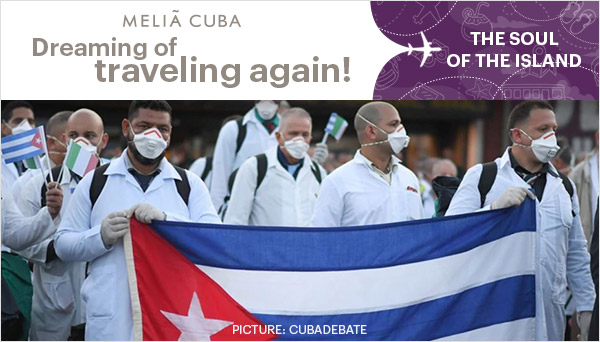Climate and its turquoise water beaches, have always made the Caribbean such a privileged place for tourism. A travel to the Antilles, with a never-ending summer and beach water temperature ranging from 26 to 30 degrees Celsius, becomes both an initiation and a true luxury experience.
Even more if it is a travel to Cuba, which not only shares fabulous natural conditions with other isles and areas of the region, but also has unique outstanding attributes that make it a special place.
Of course, we are talking about the kind and joyful nature of its people, and especially its culture in capitals, that has given to literature several Premios Cervantes (Cervantes Prize); to dance, the Cuban National Ballet; and to music such names as Lecuona, Trío Matamoros, Benny Moré, Pablo Milanés or Van Van, among many others.
Together with these assets, Cuba has other valuables which make it a safe haven that at exceptional times like the one we are facing now, will allow it to emerge from the crisis in better shape than other countries, as already seen at the public health field.
With a population of 11 million inhabitants, Cuba has one million university graduates, of which almost 100,000 are medicine doctors (9 out of 100 people). The figures of Cuban Public Health system are impressive, not only compared to those of other countries in the region but also to those of developed nations.
There are 95,000 medicine doctors on the island (among them, 2,000 are intensive care physicians and 1,200 are epidemiology specialists), 18,000 are dentists, 85,000 are nurses and 58,000 are health technicians. To emphasize these figures, it is important to say that the country has 150 hospitals, 450 policlinics, 110 dental clinics and 130 nursing homes for expectant mothers. Right now, there are near 25,000 medicine students in the country and more than 30,000 foreign students have graduated as medicine professionals at Cuban universities.
The words “medicine” and “solidarity” are synonyms to Cuban people. In the early 60`s, Cuban doctors started traveling around the world. More than 400,000 health professionals have worked in 164 countries in Latin America and the Caribbean, Africa, Middle East and Asia. About 30,000 are currently working in 60 countries. Also, to fight against this COVID-19 pandemic, Cuba has sent 1,500 doctors and nurses to 22 countries including Italy, Andorra and 3 French overseas territories: Martinique, Guadeloupe and Guyana.
Solidarity, a strong public health system and a high professional level among its people, are Cuba’s assets for a future comeback to normality. Hotels and tourist locations now closed down, are already working on new protocols for this industry, where the perception of security will be their core priority.

Knowing your health is in good hands and supported by a strong public health system, is a determining stimulus to face future challenges. Also, the exceptional natural conditions of Cuba with its hundreds of islets and extensive sand stretches in pristine beaches like Varadero or Cayo Santa María, work as a guarantee for privacy at uncrowded areas to enjoy plenty of sea and sun bathing. All this together with the good nature of Cuban people, the catchy rhythm of its music, the sense of humor against adversity, its emerald waters, the perfect combination of lemon and rum in a daiquiri or a mojito, and its proven capacity to succeed in complex scenarios, presents Cuba as a privilege in the Caribbean.

